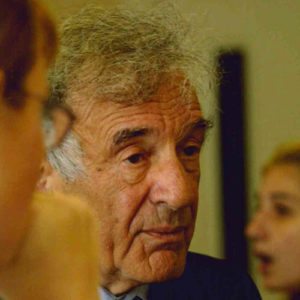I think of my 19-year-old self warmly. An anxious young person focused on how to reach and engage with a pained world. My first semester of college I had fallen in love for the first time, feeling the grand array of misery and joy that accompanies unrequited adoration. That January, I decided to come a month early while most of my first-year peers were back in their corners of New England and, largely, the world. January term was time to focus. My course, appropriately titled The End of Innocence, was to be spent intensively reading, contemplating and writing with Dr. Elie Wiesel. In fact, Dr. Wiesel was the literal and ideological center of our class. He joined us each day, drinking coffee and eating chocolate cookies in our conversation circle. We read the Book of Genesis, James Joyce, Samuel Beckett, Toni Morrison, Franz Kafka and three selections of Dr. Wiesel’s work including Dawn. Upon starting, I wrote on my syllabus, “Can one be a saint without God?”
I’m struck by the enormous privilege of spending those days with him. This wise, human person. In the very essence of his belief, he welcomed me and other tender people in. He also asked us the hardest of questions. What determines which lives are worth keeping and which are worth ending? What do we need to become kind people? How do we engage with one another? How do we partake in one another’s suffering? How important is happiness, really?
Like him, I had been puritanical early in life. Like him, I had felt the push and pull of God. I felt the confusion of where God was. I had lived in a world of privilege but sought to live with “thin skin.” And again, where do we reside in the larger structure of meaning and pain and loss? When very few of these things can be said by name? Where does our own pain fit?
During this time in January 2003, the United States was preparing to invade Iraq, and my utter confusion and distress could not be quantified. National conversations were taking place that January, and I couldn’t make sense of a premature invasion, an obviously incorrect perception of risk and a president I believed to be deeply unwise.
Later one afternoon, I approached Professor Wiesel in his office after class. Tearful, I grieved our loss of humanity. How could we treat each other in these ways? What right did we have to ever declare war? I was beside myself. In a warm room, I cried next to him. His friendship to me, so soon, was palpable. He allowed the sadness to seep in. He allowed my confusion to reside in the chair next to us. This is how friends act. This is how we treat each other. This is where grief is allowed to reside presently. Enormous it was to think about what else he had witnessed and my voice he was also witnessing.
Elie Wiesel is a warm, well-lit room of a person to me. To this day, he resides in my heart in one of its most sacred spaces of friendship. To this day, I can feel his warm company. I am struck by him as someone embodying humanity’s edges of darkness and light. Of grief, magnificent joy, acute pain and crystalline memory. I’m grateful for this. I was grateful to be the young student, and a person who still mattered. As a seeker. As a student. As a listener. As a creator of a future life and someone acknowledging we live how we can. I was a voice to him just the same.
—Anna Smith ’06


